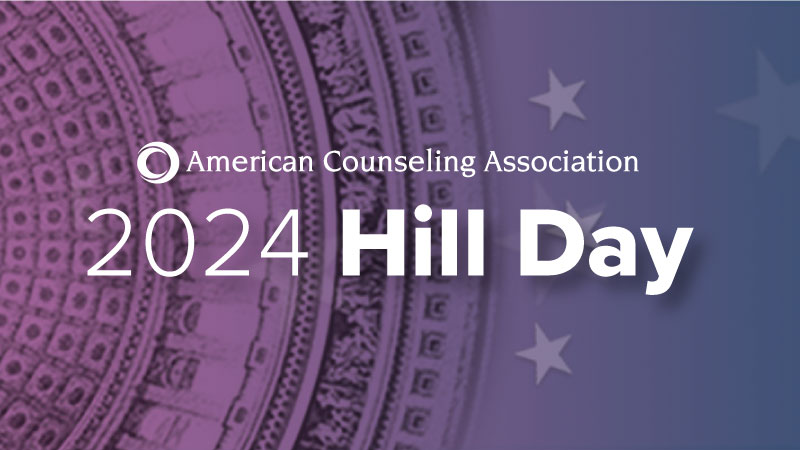
Government Affairs and Public Policy
Our Government Affairs and Public Policy team advocates for ACA members and the counseling profession on a range of issues, including
- Medicare reimbursement,
- the Counseling Compact and
- Increased funding for school counseling and mental health services.
Adding your voice makes our message stronger. Join us by contacting your representatives on issues that matter to you using our Action Center resources.

Join Us for 2024 Hill Day
May 15-16, 2024
Washington, DC
ACA Hill Day provides comprehensive training focused on equipping professional counselors with the knowledge, skills and tools needed to meet with their representatives in Congress and advocate for the profession.
Learn More
Become an Influential Legislative Advocate
Make a difference with your legislative advocacy by participating in an ACA-specialized legislative advocacy training. Whether in-person or virtual, these sessions are tailored for ACA Branches, Divisions, Regions and Colleges/Universities. Participants will learn essential skills and strategies to effectively advocate for mental health policies and regulations at the state and national levels.
Elevate your impact, influence change and champion the rights of clients and practitioners alike with ACA's legislative advocacy training.
Advocacy News
Congress Introduces Legislation to Save School Counseling Jobs
Jan 29, 2021
On Thursday, January 28, 2021, Congresswoman Jahana Hayes (CT-05) introduced the Save Education Jobs Act of 2021. This legislation would save nearly 4 million education jobs, spur economic growth in the midst of an economic crisis and help mitigate the impacts of students’ learning loss as a result of the COVID-19 pandemic.
Specifically, the bill would:
• Deliver up to $261 billion to states and school districts over 10 years. This relief would save up to 3.9 million education jobs, including 2.6 million teacher jobs as well as the jobs of school counselors, paraprofessionals, social workers, school psychologists, nurses, bus drivers, maintenance workers and more from budget cuts due to the COVID-19 pandemic.
• Guarantee funding to all states for at least six years or until the national unemployment rate falls to 5.5 percent or below (if later). Thereafter, the legislation would provide additional funding up to fiscal year 2030 for individual states that continue to experience high unemployment.
• Allow state educational agencies to reserve up to 5 percent of funding to retain or create positions in early childhood, K-12 and higher education, and ensure that low-income students and students of color are not disproportionally taught by ineffective, out-of-field or inexperienced teachers.
• Require school districts to use at least 90 percent of funding to pay the salaries and benefits of teachers, school leaders and other school personnel. This funding can be used to recall or rehire former employees, retain existing employees and hire new employees in order to provide early childhood, elementary or secondary educational related services.
• Permit school districts to use up to 10 percent of funding to support teacher training and professional development, high-quality residency programs and better teacher pay for extended school time to address learning loss.
• Ensure continued funding for K-12 education and high poverty districts with strong maintenance of effort and maintenance of equity requirements.
“Despite the heroic work of our educators, we know that COVID-19 has undone months of academic gains, exacerbated existing disparities, increased student mental health needs, and left far too many students behind,” said Congresswoman Hayes. “The cuts we are already seeing throughout the country, and can expect to continue seeing in the future, are devastating for students and the future of public education. We need to invest in more supports, not less, to ensure that schools can meet these needs and challenges during and after the pandemic.”
If you have questions or would like to become involved in ACA’s advocacy efforts, please contact the ACA Government Affairs and Public Policy team at advocacy@counseling.org.
-

The most significant benefit of my membership in the American Counseling Association (ACA) lies in its remarkable efforts to enhance the credibility of counselors in the field. The ACA's successful initiatives, such as advocating for counselors to be recognized as Medicare providers and working on the counseling compact, have greatly contributed to this.
Eric Rodgers, LPC


